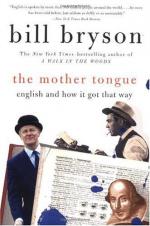
|
| Name: _________________________ | Period: ___________________ |
This test consists of 15 multiple choice questions and 5 short answer questions.
Multiple Choice Questions
1. Because of the event of #67, the works of which two authors are especially difficult to understand?
(a) Chaucer and Shakespeare
(b) Chaucer and Dante
(c) Dante and Shakespeare
(d) Chaucer and Hemingway
2. What does Chomsky think are innate in children?
(a) "Ground rules" that help them learn language
(b) The tendencies to be dyslexic
(c) Rhyming capabilities
(d) Several language barriers
3. The Celts are strongly influenced by which culture?
(a) Roman
(b) Germanic
(c) French
(d) Norwegian
4. According to the author, some words are formed out of __________________.
(a) other words
(b) misunderstandings
(c) mistakes
(d) guttural noises
5. Language issues tend to be __________________.
(a) political
(b) universal
(c) constant
(d) irreconcilable
6. Who is the Venerable Bede?
(a) A bishop
(b) A rabbi
(c) A priest
(d) A monk
7. Which country has been successful in protecting its language?
(a) Wales
(b) France
(c) Italy
(d) Ireland
8. How can English be particularly complex for non-native English speakers?
(a) Many words can be used in different ways
(b) The alphabet is long
(c) There are many grammar rules
(d) The vowel sounds are fixed
9. What is phonology?
(a) A fraud detector
(b) A sound system for a language
(c) A phonograph history
(d) Telephone operator skills
10. All English speakers can understand each other despite ______________________________.
(a) differences in vocabulary and pronunciation
(b) geographical differences
(c) age group
(d) financial status
11. According to the author, varieties of English are heavily influenced by what?
(a) geographic reasons
(b) financial reasons
(c) ancestral reasons
(d) social reasons
12. Regional trends have common accent features but no speakers who _________________________________.
(a) can be emulated
(b) can emulate someone else
(c) can teach proper English
(d) all speak in exactly the same way
13. What did Sir William Jones recognize?
(a) The adaptability of the English language
(b) The verb tenses of European languages
(c) Similarities between Sanskrit and languages of Europe
(d) The rhythm of the Romance languages
14. On what does a child's vocabulary rely?
(a) IQ
(b) Geographic area
(c) Nationality
(d) Exposure to the speech of the primary caregiver
15. The pronunciations of many words in America reflect what speakers think British speakers say and _______________________.
(a) tries to do the opposite
(b) rejects them outright
(c) ignores them
(d) attempts to imitate them
Short Answer Questions
1. Why could the Neanderthals not keep up with the Cro-Magnons?
2. Who were two champions for the simplification of English spelling?
3. The English writing system developed from what?
4. For what is the Venerable Bede famous?
5. What do the Asian languages have less of than other languages?
|
This section contains 437 words (approx. 2 pages at 300 words per page) |

|




